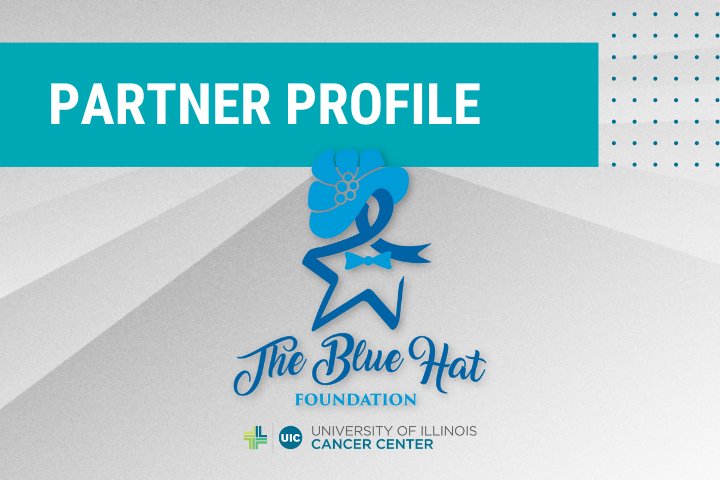
March is Candace Henley’s month. A 20-year colorectal cancer survivor, Henley’s The Blue Hat Foundation, Inc., for Colorectal Cancer Awareness, hosts its two biggest events of the year during Colorectal Cancer Awareness Month: March Screening Madness and Blue Hat Bow Tie Sunday.
This year, the events take on extra meaning because Henley, co-chair of the University of Illinois Cancer Center’s Community Advisory Board, is undergoing treatment for her second recurrence of colon cancer.
“I’m very transparent because I really want people to understand what it takes to deal with this disease and why I do what I do,” she said.
March Screening Madness: Improving Colorectal Cancer Awareness
March Screening Madness is largely a social media campaign waged to raise colorectal cancer awareness in conjunction with the Big Ten Cancer Research Consortium and its affiliated universities, which include the University of Illinois Chicago (UIC) and the University of Illinois Urbana-Champaign.
As part of March Screening Madness, the Cancer Center and the UI Health Mile Square Health Centers, a network of federally qualified health centers (FQHCs), teamed up on a campaign to send postcards and MyChart messages to patients 45 and older reminding them of their eligibility to be screened for colorectal cancer, which disproportionately affects African Americans.
The messages include a phone number and QR code patients can use “to connect with a Mile Square Health Center Patient Navigator and get in the game,” a nod to the annual NCAA March Madness basketball tournament that’s happening.
Blue Hat Bow Tie Sunday
Blue Hat Bow Tie Sunday is the faith-based screening event hosted annually by Henley’s foundation at her large Chicago church, Trinity United Church of Christ, where people are asked to wear blue to honor a survivor of colon cancer or someone who has died from the disease. The event takes place on March 26.
This year, Henley expanded Blue Hat Bow Tie Sunday internationally by partnering with the Global Colon Cancer Association, which advocates for “patient-centered policy around the globe” to ensure increased colorectal cancer awareness, screening and access to quality medical treatments, according to its website. She also became the group’s Director of Health Equity and Partnerships to help guide the organization in its health equity work internationally.
“Every day someone is dying from this disease, someone is being diagnosed with this disease, someone is suffering from this disease. There’s still not enough champions talking about colorectal cancer and that bothers me,” Henley said.
